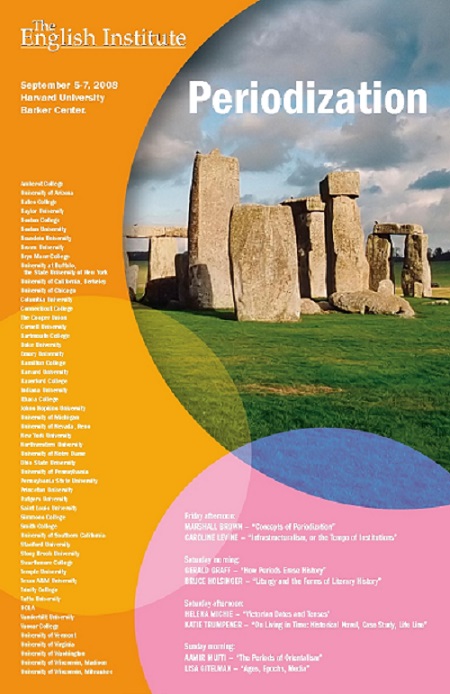
The English Institute, now in its 67th year, an organization of literary scholars and critics and a leading indicator of trends in literary study, is now turning its attention to some of the building-blocks of the profession and craft: periodization, genre, authorship, reading, the critic’s voice, and other issues of key concern to students, teachers, scholars and theorists of literature. How do the conceptual and organizational structures in which we group and analyze literary works affect the understanding of those works themselves? Do supposedly neutral frames like history, sequence, chronology and genre reveal, but also conceal, some key aspects of the texts under consideration? What are the consequences of these conceptual frameworks, for the individual reader, for scholarship and teaching, and for the field?
2008 Conference Topic: PERIODIZATION
” … the field-coverage model solved the problem of theory. Departmental organization took the place of theory, for the presence of an ordered array of fields, fully staffed, made it unnecessary for anyone to have a theory about what the department should do to permit the work of teaching and research to go on. The theoretic choices had already been taken care of in the grid of periods, genres, and other catalog rubrics, which embodied a clear and seemingly uncontroversial conceptualization of what the department is about. With literature courses ranged in periods and genres, instructors did not need to ask what ‘period’ or ‘genre’ meant or what justified the established demarcations. The connections and contrasts between periods and genres, so important for understanding these categories, fell between the cracks, as did other large issues in the university, such as the relation between the sciences and the humanities, which was the responsibility of neither the sciences nor the humanities.”
[from “Taking Cover in Coverage” by Gerald Graff]
2008 Conference: September 5-7, Harvard University
Program
Friday afternoon:
Marshall Brown – “Concepts of Periodization”
Caroline Levine – “Infrastructuralism, or the Tempo of Institutions”
Saturday morning:
Gerald Graff – “How Periods Erase History”
Bruce Holsinger – “Liturgy and the Forms of Literary History”
Saturday afternoon:
Helena Michie – “Victorian Dates and Tenses”
Katie Trumpener – “On Living in Time: Historical Novel, Case Study, Life Line”
Sunday morning:
Aamir Mufti – “The Periods of Orientalism”
Lisa Gitelman – “Ages, Epochs, Media”